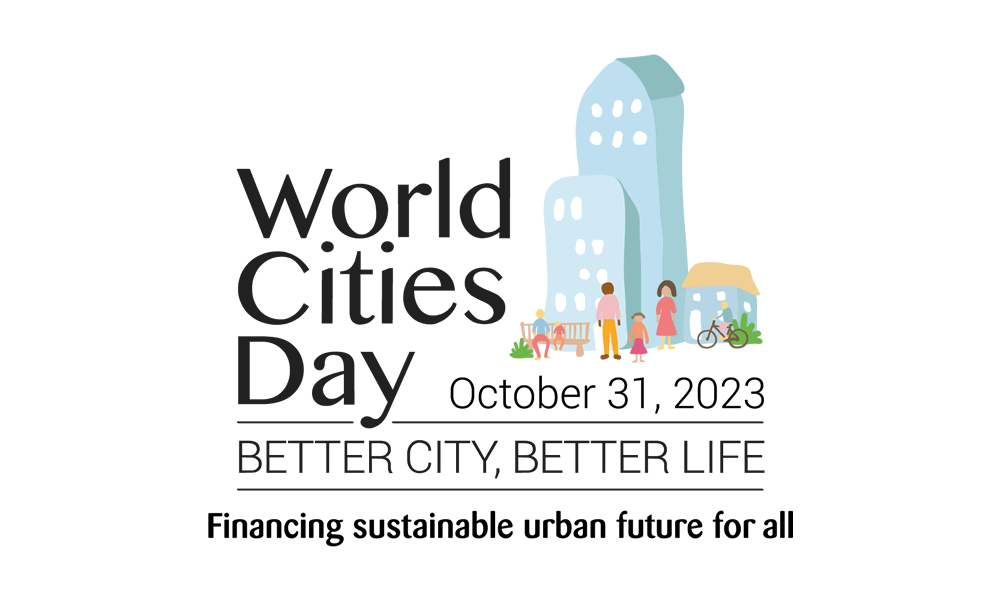« December 2021 | Main | February 2022 »
January 31, 2022
University Grants Commission (UGC), India, invites feedback from all stakeholders on the Draft of its National Higher Education Qualification Framework (NHEQF).
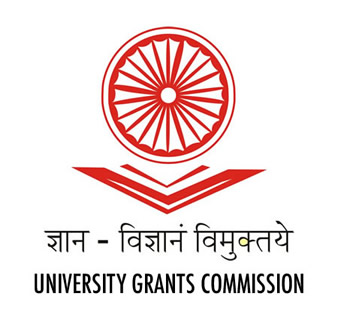
New Delhi, January 31, 2022 — University Grants Commission (UGC), India, has invited feedback from all stakeholders on the National Higher Education Qualification Framework (NHEQF) it has drafted. The input should reach UGC latest by February 13, 2022.
According to the UGC communication, the National Education Policy (NEP) 2020 stipulates that UGC would formulate a National Higher Education Qualification Framework (NHEQF) in sync with the National Skills Qualifications Framework (NSQF). The National Higher Education Qualification Framework (NHEQF) will ease the integration of vocational education into higher education and prescribe the facilitative norms for issues such as credit transfer and equivalence. Furthermore, NHEQF would, in terms of such learning outcomes, provide a refined description of the higher education qualifications leading to a degree/diploma/certificate.
Source: University Grants Commission (UGC)
|GlobalGiants.Com|
Suggestions are invited from all stakeholders on the Draft National Higher Education Qualification Framework(NHEQF) developed as part of NEP 2020 recommendations.
— UGC INDIA (@ugc_india) January 30, 2022
Please send your suggestions on nepnheqf@gmail.com by 13th February, 2022https://t.co/8ff778CWiL pic.twitter.com/RpwDKHfkgQ







Edited & Posted by the Editor | 3:46 AM | View the original post
January 30, 2022
India Republic Day Celebrations: ‘Beating Retreat’ ceremony in New Delhi
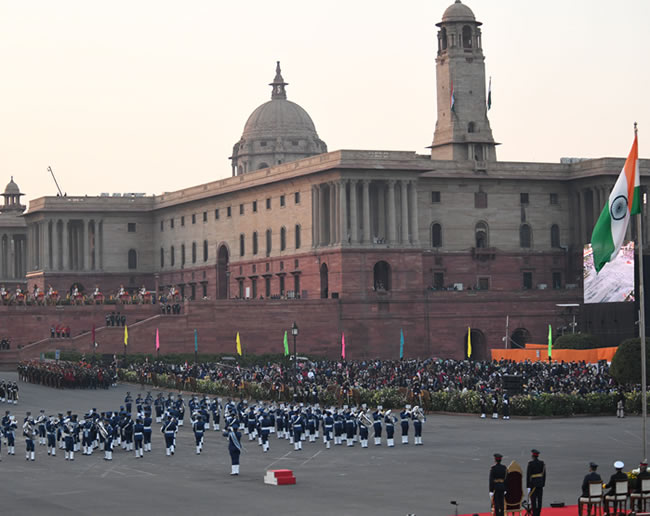
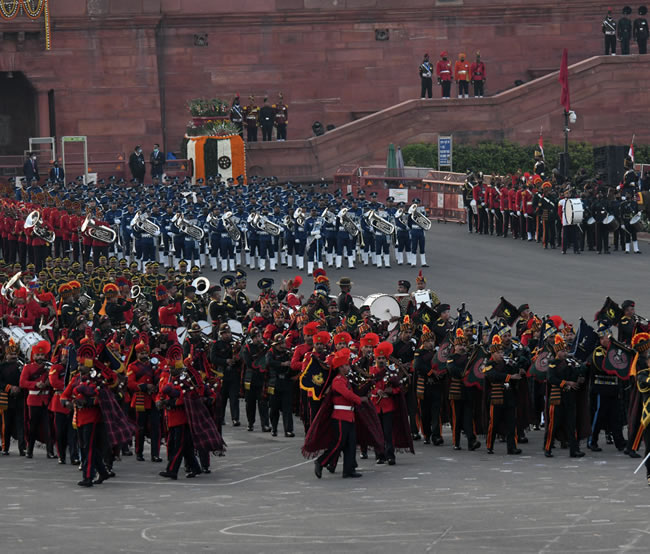
Photos: Band performing at the ‘Beating Retreat’ ceremony, at Vijay Chowk, in New Delhi on January 29, 2022.
|GlobalGiants.Com|







Edited & Posted by the Editor | 1:46 PM | View the original post
January 29, 2022
The University of Essex extends its School Membership Scheme in India.
- More partner schools benefit from being up-to-date with current higher education issues and applying to UK universities, plus invites to University of Essex events and support throughout the year.
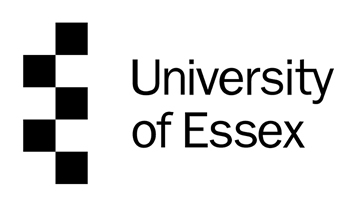
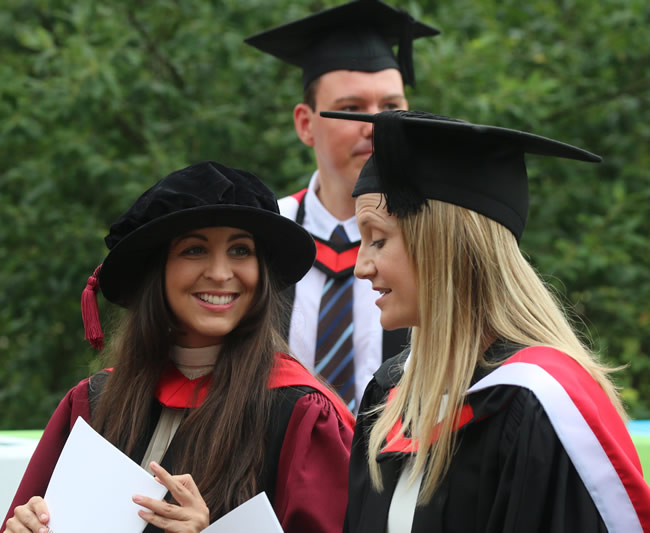
Photo: Graduation at the University of Essex. Image provided by & copyright © University of Essex.
NEW DELHI, January 27, 2022 — The University of Essex, a dedicated UK-based public research university that supports the overall development of students, is extending its School Membership Scheme in India to offer structured support and engagement with more schools.
The University’s School Membership Scheme creates an exclusive network of schools and colleges worldwide. The University of Essex offers focused support to students, teachers, and counselors based at member schools.
Each year, the University of Essex works closely with the partner schools to ensure the members are up-to-date with current higher education issues. It provides extra support and advice on undergraduate UCAS (Universities and Colleges Admissions Service), Clearing cut-offs, scholarships, scholarships, personal statement writing guides, and revision guidance. In addition, partner schools and colleges receive invitations to upcoming activities they can engage with at the University.
In addition, there are priority visits from the University of Essex’s India-based Student Recruitment team, bespoke virtual/on-campus visits for school counselors or academic staff, and regular newsletters for members.
Member schools get an invitation to the University of Essex’s Annual Teachers Conference, which provides unique networking and Continuing Professional Development (CPD) opportunities both in-person and virtually. Essex also offers travel bursaries to travel to the University’s Colchester and Southend Campuses.
There is no cost associated with membership. The participating schools are only required to actively participate in the scheme, attend member events and engage in the network activities.
Schools actively participating in the program include:
- Delhi Public School, Gurgaon
- Delhi Public School, Vasant Kunj, New Delhi
- St. John’s High School, Chandigarh, and
- Stepping Stones School, Chandigarh.
Sandeep Sharma, Director of Student Recruitment and Partnerships - South Asia at Essex, said, “The School Membership Scheme is a critical element of our work to expand engagement with schools and colleges in India. The membership offers them opportunities for knowledge exchange, guest lectures from leading academics at Essex, sponsorship support for events, and academic scholarships for their students.
“By engaging early and actively, we believe we will be able to add value to the counseling support offered by schools while helping their students make the best choices regarding their undergraduate study overseas.”
“We are looking to welcome 15 more schools each year over the next two to three years through our scheme, and we’re looking forward to working with a growing number of partners in India.”
Founded in 1964, the University of Essex is one of the UK’s leading universities. The University maintains three campuses at Colchester, Southend, and Loughton. Essex has three faculties that deliver excellence in teaching and research: the Faculty of Arts and Humanities, Science and Health, and the Faculty of Social Sciences. It has close to 1,000 active researchers and 17,000 students from over 140 countries, with an alumni strength of over 100,000. It was named the University of the Year at the Times Higher Education Awards 2018 and in the top 25 for research quality in The Times and Sunday Times Good University Guide 2022.
Source: University of Essex
|GlobalGiants.Com|







Edited & Posted by the Editor | 4:16 AM | View the original post
January 28, 2022
Las Vegas Man Sells USA's First Silver Dollar for $12 Million to GreatCollections
- California buyer sets record for the world’s most valuable silver coin and the second-highest price ever paid for any rare coin.
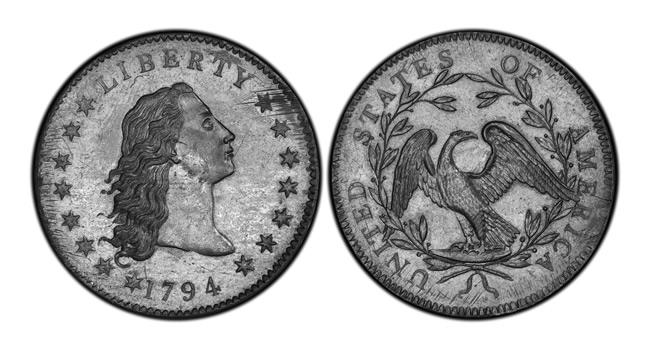
Photo: Believed by many rare coin researchers to be the first silver dollar struck by the United States Mint, this 1794-dated dollar has been purchased for a record $12 million by GreatCollections Coin Auctions of Irvine, California from Las Vegas, Nevada collector Bruce Morelan. Image credit: GreatCollections Coin Auctions.
IRVINE, Calif., Jan. 28, 2022 — A Las Vegas, Nevada resident has sold his prized possession, a superb condition silver dollar made in 1794. Many rare coin experts believe it is the first silver dollar ever struck by the United States Mint. It has been purchased for a record $12 million by GreatCollections Coin Auctions of Irvine, California.
- George Washington, Alexander Hamilton, and Thomas Jefferson may have seen it.
Vegas business executive Bruce Morelan paid $10,016,875 for the acclaimed rare coin in 2013, a record at the time, and exhibited it across the country and in Europe. One of the coin’s previous owners was Amon G. Carter Sr. (1879-1955) of Texas, a former Fort Worth Star-Telegram newspaper publisher.
Ian Russell, president of GreatCollections, said, “Because of its sharpness of detail, researchers believe this coin was especially struck, perhaps as a presentation of the country’s first dollar coin. President George Washington, Treasury Secretary Alexander Hamilton, and then-Secretary of State Thomas Jefferson, who oversaw the young United States Mint, may have seen this coin because of its significance. Without question, this is America’s most coveted silver dollar, a national numismatic treasure. It gave me chills closing the transaction for this piece of history.”
Intended to help replace Spanish, English, Dutch, and French coins commonly in circulation in the USA’s post-Colonial era, the United States Mint delivered a total of 1,758 silver dollars made in Philadelphia on a hand-turned coining press to government officials in October 1794.
“Only about 140 still survive, and this 1794 silver dollar is the only known specimen-striking, substantially better than the examples in the Smithsonian Institution’s National Numismatic Collection and the American Numismatic Association museum,” said Russell.
The front of the dollar depicts 1794 with a symbolic female representation of liberty and the word LIBERTY. The design on the back is an eagle surrounded by a wreath and the words, UNITED STATES OF AMERICA.
Experts authenticated the coin at Professional Coin Grading Service and designated it as a specially-made specimen strike. They graded it as a great, mint state 66 on the numismatic grading scale of 1 to 70. John Albanese, founder of Certified Acceptance Corporation in Far Hills, New Jersey, negotiated the sale transaction with GreatCollections on behalf of Morelan.
Morelan, 60, began collecting at the age of six. “Coins are in my blood, and the 1794 dollar was a lifelong dream,” he stated. “I’m truly blessed to have owned it and hope the new owner has as much joy, pride, and satisfaction as I did.”
“This 1794 silver dollar was the world’s most valuable rare coin for nearly a decade after Morelan purchased it for $10 million in 2013. At its latest sale price of $12 million, it is the world’s most valuable silver coin and now the second most valuable rare coin of any kind. Last year’s $18.9 million sales of the 1933 Saint-Gaudens Double Eagle (U.S. $20 denomination) gold coin set the new record,” explained Russell. He exhibited that gold piece at the 2021 Chicago World’s Fair of Money on behalf of its anonymous new owner.
GreatCollections is an auction house for certified coins and banknotes, handling both private transactions and public auctions from start to finish. Since its founding in 2010, GreatCollections has successfully auctioned over 995,000 certified coins, making it one of the leading accredited coin companies in the United States, with annual sales in 2021 exceeding $235 million.
Source: GreatCollections
|GlobalGiants.Com|







Edited & Posted by the Editor | 2:16 PM | View the original post
January 27, 2022
Future of the University, as we know it, is Under Threat - EY Report.
- Advanced economies may have hit “peak higher education.”
- Disruption from temporary remote learning may be just the tip of the iceberg
- An agile approach to business reinvention is essential for universities to survive
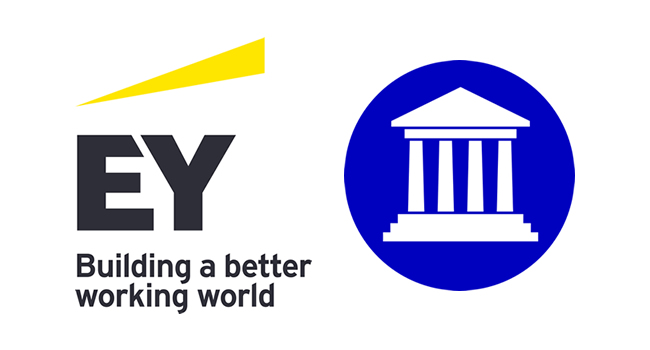
LONDON, Jan. 27, 2022 — A new EY report, “Are universities of the past still the future?” argues that universities in advanced economies face several existential issues in the wake of the COVID-19 pandemic.
The report derives its conclusions from EY analysis about the future of the higher education sector and 29 interviews with university leaders from the US, UK, India, Singapore, and Australia. The report finds that universities quickly need to adapt to a new reality due to demographic shifts, geopolitical challenges, changing workplace demands, and high student expectations for a quality digital experience.
If they’re not willing to rethink their purpose and how they deliver value, some of the challenges thrown up by the COVID-19 pandemic could rapidly develop into existential threats. So it is time to start asking difficult questions, challenge the status quo, and look at the opportunities the pandemic has created to rethink how and where higher education is delivered - and to whom.”
The report, published on the International Day of Education, recommends that universities take a “future-back” approach, looking ahead to 2030 to understand how five bold scenarios could require a radical transformation of their operating models if they are to remain competitive:
What if the cost of learning is driven down to zero? — The advent of widespread digital and distance learning is already radically reimagining the classroom as we know it. Universities must use digital learning experiences to augment what makes them unique and reinvent their learning delivery around that to meet the needs of tomorrow’s students and lifelong learners.
What if learning journeys are entirely flexible and customizable? — The power is shifting rapidly into the hands of the learner. Universities need to recognize this and provide students with personalized, flexible learning options.
What if higher education providers are accountable for results? — Universities have lost their monopoly on accreditation, and non-degree, lifelong-learning credentials are becoming mainstream. Universities have to prepare for a world where a location or brand reputation is less critical to learners than the measurable quality and effectiveness of their teaching and learning outcomes in helping learners reach their career and life aspirations.
What if commercialized research pays for itself? — Research is the lifeblood of universities, from deciding rankings to attracting the best minds to producing value for society. Still, it is costly and is heavily subsidized by tuition fee revenues. Instead, universities could shift to prioritize commercial, demand-driven research, collaborating more closely with industry and capital markets and then working with governments for better funding for non-commercial research of national or international value and significance.
What if technology could solve the global supply and demand mismatch? — Technology is helping those in developing countries to access higher education in new ways, allowing universities to expand their reach exponentially. As a result, western universities looking for new markets have a tremendous opportunity to partner with in-country providers to roll out sought-after, high-quality education in these growing markets, using technology to do so at scale and a price point affordable locally.
Catherine Friday, EY Global Education Leader, says:
“The COVID-19 pandemic exposed how far universities have to go when it comes to finding their place in the future of education and laid bare their over-reliance on on-campus learning and international students in shrinking domestic undergraduate markets. There is no going back to the way things were, and technology will continue to change the game across the higher education sector. So on this International Day of Education, universities need to start thinking and planning how they’re going to address the need for reinvention and fit into the future’s post-secondary and lifelong learning landscape.”
Source: EY
|GlobalGiants.Com|







Edited & Posted by the Editor | 2:14 PM | View the original post
January 26, 2022
Republic Day Parade 2022 showcases India’s military & cultural diversity in a grand march at Rajpath, New Delhi.

Photo: Howitzer Mark-1 passes through the Rajpath, at the 73rd Republic Day Celebrations, in New Delhi on January 26, 2022.

Photo: Naval Marching Contingent passes through the Rajpath, at the 73rd Republic Day Celebrations, in New Delhi on January 26, 2022.

Photo: Naval Band passes through the Rajpath, at the 73rd Republic Day Celebrations, in New Delhi on January 26, 2022.

Photo: Combined Band of Bihar Regimental Centre, Army Service Corps Center, and Army Ordnance Corps Centre passes through the Rajpath, at the 73rd Republic Day Celebrations, in New Delhi on January 26, 2022.

Photo: Sikh Light Infantry Regiment Marching Contingent passes through the Rajpath, at the 73rd Republic Day Celebrations, in New Delhi on January 26, 2022.
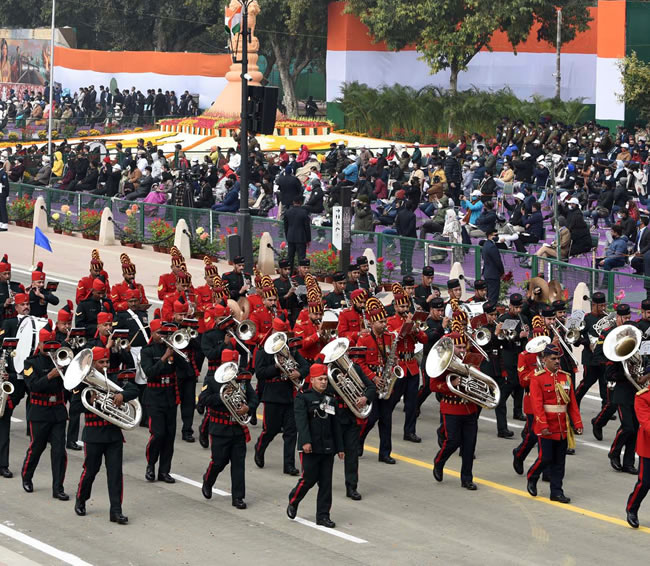
Photo: Combined Band of JAI LI Regimental Center, Army Medical Corps Center, and 14 Gorkha Training Centre passes through the Rajpath, at the 73rd Republic Day Celebrations, in New Delhi on January 26, 2022.

Photo: Assam Regiment Marching Contingent passes through the Rajpath, at the 73rd Republic Day Celebrations, in New Delhi on January 26, 2022.
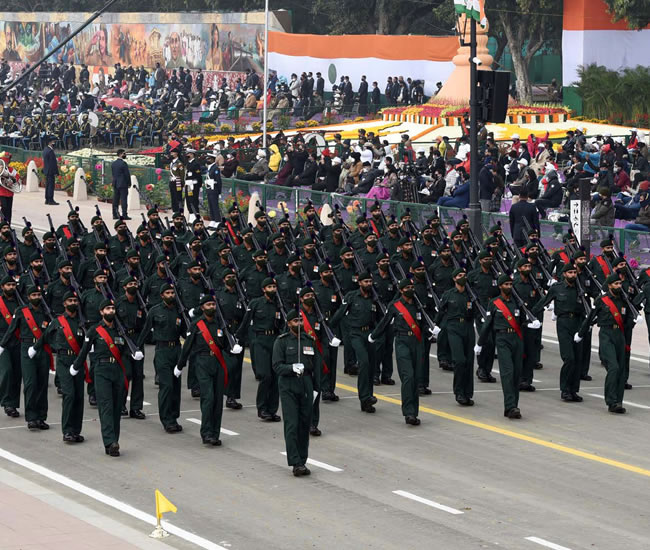
Photo: Rajput Regiment Marching Contingent passes through the Rajpath, at the 73rd Republic Day Celebrations, in New Delhi on January 26, 2022.
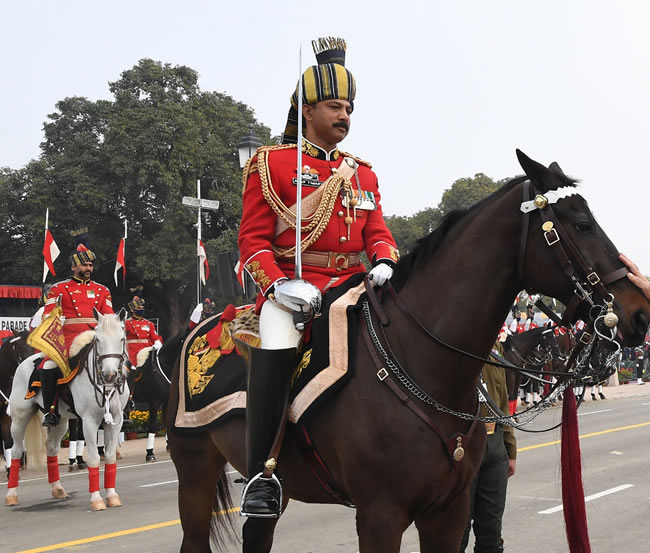
Photo: Glimpse of the 73rd Republic Day Celebrations, at Rajpath, in New Delhi on January 26, 2022.

Photo: Glimpse of the 73rd Republic Day Celebrations, at Rajpath, in New Delhi on January 26, 2022.

Photo: Glimpse of the 73rd Republic Day Celebrations, at Rajpath, in New Delhi on January 26, 2022.
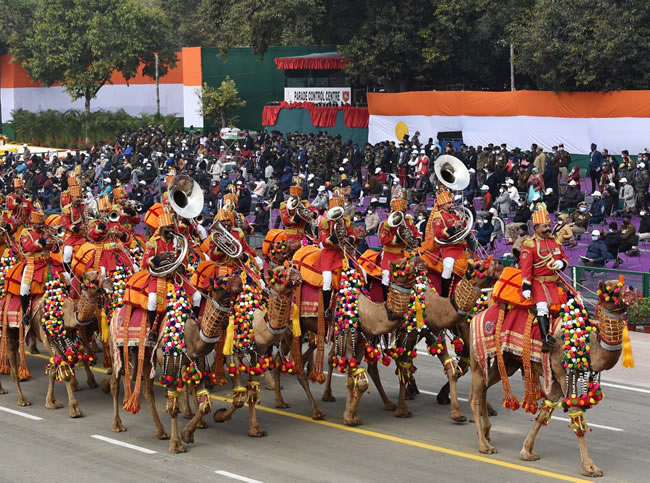
Photo: Border Security Force (BSF) Camel Band passes through the Rajpath, at the 73rd Republic Day Celebrations, in New Delhi on January 26, 2022.

Photo: Tiger Cat Missile System passes through the Rajpath, at the 73rd Republic Day Celebrations, in New Delhi on January 26, 2022.
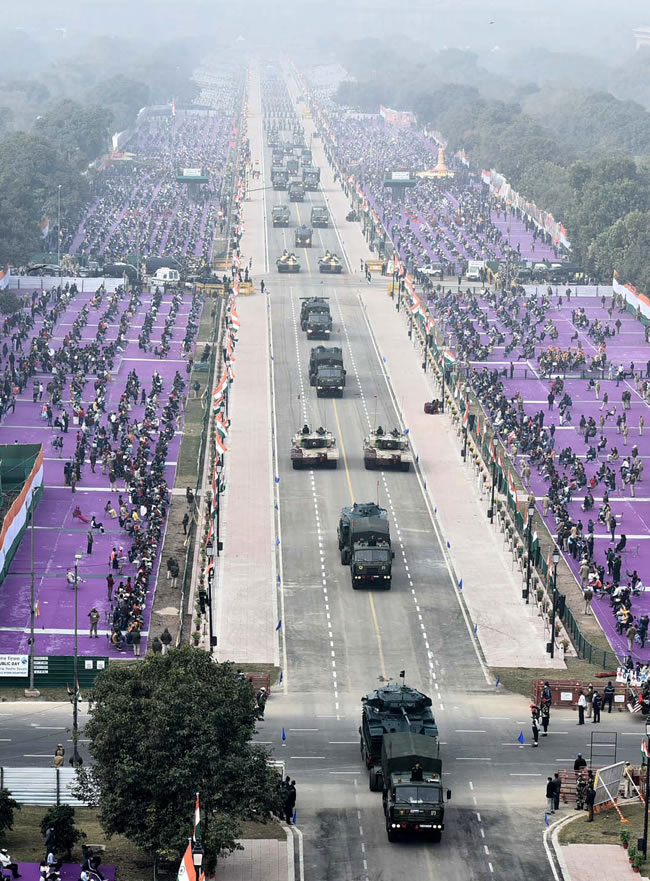
Photo: A bird’s eye view of Rajpath, at the 73rd Republic Day Celebrations, in New Delhi on January 26, 2022.
|GlobalGiants.Com|







Edited & Posted by the Editor | 8:55 AM | View the original post
January 22, 2022
Armani Beauty announces Tessa Thompson as the Newest Beauty Face.

Photo: Tessa Thompson for Armani beauty by Mikael Jansson.

PARIS, Jan. 21, 2022 — Armani beauty has announced American actress Tessa Thompson as the newest face. Thompson will feature in both the campaigns for the iconic LUMINOUS SILK FOUNDATION and the new LIP POWER, shot by Swedish photographer Mikael Jansson.
According to Armani, its LUMINOUS SILK FOUNDATION is the first expression of its philosophy of perfecting the complexion with the lightest touch. It comes in a range of 40 colors to suit every skin tone. LIP POWER is a long-wear satin lipstick formulated with protective, comfortable oils and high-intensity pigments to deliver vivid color with all-day wear, comfort, and a lightweight feel. In addition, its innovative drop-shaped bullet allows for easy application and precise, defined lines.
“My idea of beauty applies to every woman as it enhances her personality and uniqueness. Tessa Thompson struck me with the radiant energy she exudes, the deep calmness of her way of being. I am delighted to be able to work with her and express a new facet of the feminine kaleidoscope of Armani beauty”, said Giorgio Armani.
Tessa Thompson added: “Our ideas around what is beautiful, culturally, are shifting and becoming more inclusive. What I love about Armani is how it empowers any woman to feel her best self.”
Born in Los Angeles, Thompson started in the theater then had minor roles in television before establishing her name in the film. Her first notable breakout film role was “Dear White People” in 2014, followed by Ava DuVernay’s 2014 film “Selma.” In 2019, Thompson appeared on the cover of TIME magazine as the Leader of the Next Generation. In 2020, Thompson co-starred in “Sylvie’s Love,” which she also produced. Thompson has most recently won acclaim for her role as Irene Redfield in Rebecca Hall’s 1920s-set film “Passing,” released in November 2021. Alongside her acting career, in 2021, Thompson launched her own production company, Viva Maude.
Tessa Thompson joins Armani beauty alongside actresses Cate Blanchett, Zhong Chuxi, Adria Arjona, Alice Pagani, and Greta Ferro; actors Ryan Reynolds, Jackson Yee, and Nicholas Hoult; and models Barbara Palvin, Madisin Rian, and Valentina Sampaio. Each Armani beauty face, in its unique way, incarnates Giorgio Armani’s vision of beauty.
Armani beauty delivers textured make-up, skincare formulated from pioneering science, and fragrances created with rare ingredients. The company says its make-up line enhances natural beauty, revealing rather than hiding, and real people and their needs inspire it.
Source: Armani Beauty
|GlobalGiants.Com|







Edited & Posted by the Editor | 2:38 AM | View the original post
January 21, 2022
Mastercard unveils a Next-Generation Virtual Card Solution for Instant B2B Payments.
Mastercard Track Instant Pay uses machine learning and straight-through processing to analyze and automatically initiate instant payment of supplier invoices.
The new, first-of-its-kind virtual card solution is integrated with Mastercard Track Business Payment Service to deliver more excellent choices, faster payments, and improved efficiency for buyers and suppliers.

Purchase, NY, January 20, 2022 — Mastercard today announced the launch of Mastercard TrackTM Instant Pay, a next-generation virtual card solution that uses machine learning and straight-through processing to enable instant payment of supplier invoices. Mastercard’s open-loop B2B network is integrated with Mastercard Track Business Payment Service. This new, first-of-its-kind virtual card solution delivers more excellent choice, efficiency, and automation for buyers and suppliers to help streamline and speed business payments. The company explained.
Slow and inefficient payment processes continue to create challenges for businesses. Lengthy payment terms and late invoice payments impact cash flow for suppliers, while manual invoice approval and check processing are costly and time-consuming for buyers. Other payment methods, like ACH, require buyers to safeguard sensitive bank account information, adding another layer of complexity. Research shows a growing demand from businesses to automate supplier payments with virtual cards, but existing solutions aren’t meeting these needs, with 90% of virtual card transactions still being processed manually.
Mastercard Track Instant Pay is the first virtual card solution that can safely and intelligently authorize an immediate payment to a supplier once they submit an invoice. The solution uses sophisticated machine learning to analyze invoices and identify those likely to get rejected, enabling the rest to get authorized for payment on the same day they’re received. Digital payments are sent directly and securely to a supplier’s bank account via a Mastercard virtual card, with no manual intervention required. The company elaborated.
“Delayed payments create significant challenges for businesses financially and operationally, especially in today’s environment,” said Ron Shultz, executive vice president, New Payment Flows, North America at Mastercard. “Track Instant Pay helps solve these pain points by enabling buyers and suppliers to automate their manual payment processes, unlocking valuable time, working capital, and choice. This innovative new solution is the latest step in our ongoing commitment to support multiple payment rails and mission to modernize B2B payments.”
‘Mastercard Track Instant Pay’ combines machine learning capabilities from Previse, an artificial intelligence, and data science company, with Mastercard’s core commercial solutions and global payment network to transform how businesses send and receive payments. The answer is part of Mastercard’s comprehensive suite of B2B products and services designed to reduce complexity and risk, cut costs, and automate processes for businesses worldwide.
Key benefits of ‘Mastercard Track Instant Pay’ include:
Suppliers: By accelerating payments, Mastercard Track Instant Pay helps suppliers improve cash flow and unlock working capital to reinvest in their business. Instant payments eliminate costs associated with chasing collections on outstanding invoices, and rich remittance information is provided with each amount, simplifying reconciliation.
Buyers: With Mastercard Track Instant Pay, buyers can grow revenue by increasing acceptance and converting costly check and ACH payments to rebate-generating virtual cards. Automating manual processes helps lower costs, accelerate payments, and remove friction to improve business relationships. In addition, buyers can manage their working capital more efficiently using the credit line tied to their commercial card account, while unique, dynamically generated virtual account numbers with layers of controls provide enhanced security for supplier payments.
Issuers: Mastercard Track Instant Pay can help issuers grow and extend the reach of their virtual card programs to meet increasing demand and gain a competitive advantage.
Mastercard Track Instant Pay is available in the United States with plans for international expansion, as Mastercard continues to onboard partners as part of its mission to modernize business payments.
Source: Mastercard
|GlobalGiants.Com|







Edited & Posted by the Editor | 1:45 AM | View the original post
January 20, 2022
Gigantic and Magnificent Scrolls created at Chandigarh and Odissa under ‘Kala Kumbh’ Initiative, Installed at Rajpath for India Republic Day 2022 celebrations
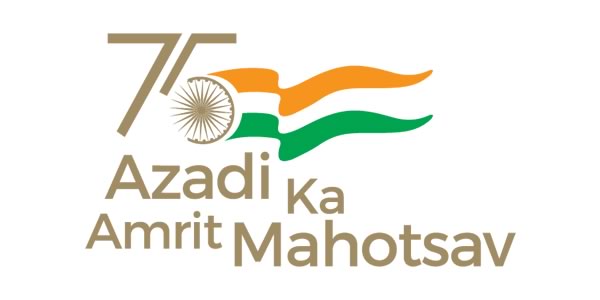
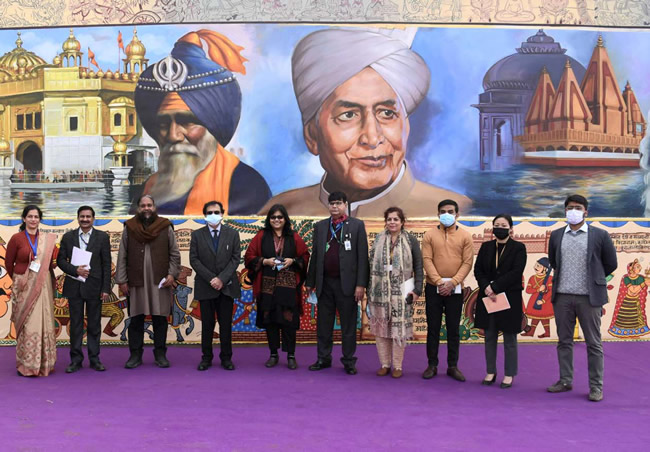
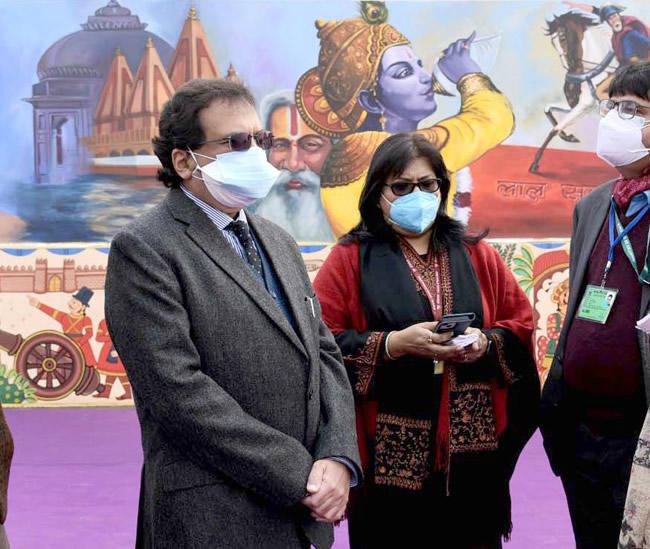
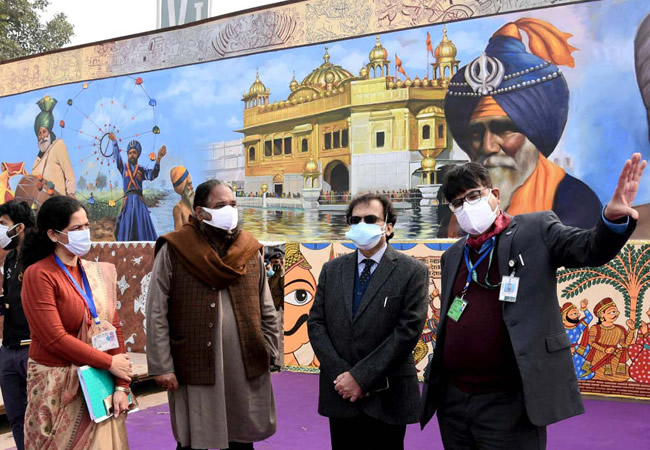
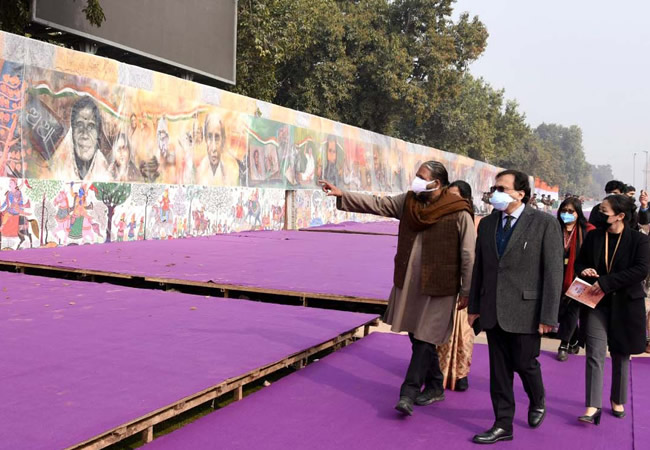
Photos: The Secretary, Ministry of Culture, Mr. Govind Mohan, visiting Rajpath to review the installation of Gigantic Kala Kumbh Scrolls created at Chandigarh and Odissa for Republic Day 2022 in New Delhi on January 20, 2022.
New Delhi, January 20, 2022 — The gigantic and spectacular scrolls created at Chandigarh and Odissa under the unique initiative ‘Kala Kumbh’ have been installed at the Rajpath for the Republic Day 2022 celebrations. The scrolls adorn either side of the Rajpath and present an awe-inspiring view. Secretary, Culture, Govind Mohan visited Rajpath and inspected the installations.
These scrolls analyze the potential of art to express national pride and excellence with varied forms of craftwork from diverse geographical locations of the country. More than five hundred artists have diligently researched upon, painted enthusiastically, and participated in special workshops or ‘Kala Kumbh’ at two locations, Odisha and Chandigarh.
Briefing media persons, Mr. Govind Mohan said that as we celebrate Azadi Ka Amrit Mahotsav, the 750 m long scrolls are a unique initiative of the Ministry of Culture and Ministry of Defence. He added that local artists from different regions had painted the magnificent scrolls that primarily portray the tales of bravery of unsung heroes of the freedom struggle. The scrolls reflect the varied art forms of these artists brought together on a single platform in the true spirit of Ek Bharat Shrestha Bharat, the Secretary explained. Mr. Govind Mohan further said that after Republic Day, the scrolls will be taken to different parts of the country and exhibited as part of Azadi Ka Amrit Mahotsav.
At Odisha, the National Gallery of Modern Art, New Delhi collaborated with Kalinga Institute of Technology and Silicon Institute of Technology in Bhubaneswar from 11th - 17th December. At Chandigarh, the National Gallery of Modern Art, New Delhi, collaborated with Chitkara University Chandigarh from December 25, 2021, to January 2, 2022.
Kala Kumbh, Azadi Ka Amrit Mahotsav, reflects the essence of unity in diversity while also analyzing the initiative of the Government of India to celebrate and commemorate 75 years of progressive India and the glorious history of its people, culture, and achievements.
Source: Ministry of Culture, Government of India
|GlobalGiants.Com|







Edited & Posted by the Editor | 9:38 AM | View the original post
January 19, 2022
Bloomberg Philanthropies Announces 15 Winners of the Global Mayors Challenge
Yearlong Competition Launched in 2021 Elevates the Most Promising Urban Innovations to Emerge from the Pandemic
The Winning Cities Receiving $1 Million and Multi-Year Technical Support are Amman, Jordan; Bogotá, Colombia; Butuan, Philippines; Freetown, Sierra Leone; Hermosillo, Mexico; Istanbul, Turkey; Kigali, Rwanda; Kumasi, Ghana; Paterson, New Jersey, USA; Phoenix, Arizona, USA; Rochester, Minnesota, USA; Rotterdam, the Netherlands; Rourkela, India; Vilnius, Lithuania; and Wellington, New Zealand.

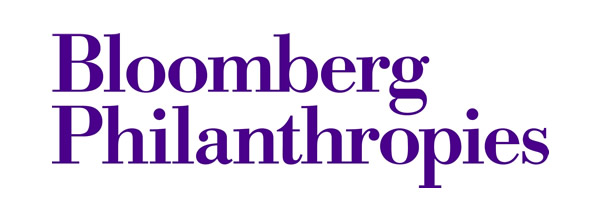
NEW YORK, Jan. 18, 2022 — Bloomberg Philanthropies has announced the 15 winning cities of the 2021-2022 Global Mayors Challenge, the fifth edition of the worldwide innovation competition that supports and spreads cities’ most promising ideas. Bloomberg has recognized these 15 winners for designing the boldest and most ambitious urban innovations to emerge from the global COVID-19 Pandemic. The winning statements address one or more of four current issue areas in cities, including economic recovery and inclusive growth, health and wellbeing; climate and environment; and gender and equality. Each city will be awarded one million dollars in addition to technical support and coaching over three years to bring their ideas to life.
“As the world works to address the profound public health and economic effects of the ongoing pandemic, cities can implement innovative ideas at a pace that national governments simply can’t match,” said Michael R. Bloomberg. He is the founder of Bloomberg Philanthropies and Bloomberg L.P. and 108th Mayor of New York City. “Our fifteen winners offer bold, achievable plans to improve health, reduce unemployment, empower women, and more. Collectively, they have the potential to improve millions of their residents’ lives - and the most successful solutions will inspire cities around the world to embrace them,” he added.
• The 15 winners of the 2021-2022 Bloomberg Philanthropies Global Mayors Challenge are:
- Amman, Jordan;
- Bogotá, Colombia;
- Butuan, Philippines;
- Freetown, Sierra Leone;
- Hermosillo, Mexico;
- Istanbul, Turkey;
- Kigali, Rwanda;
- Kumasi, Ghana;
- Paterson, New Jersey, USA;
- Phoenix, Arizona, USA;
- Rochester, Minnesota, USA;
- Rotterdam, the Netherlands;
- Rourkela, India;
- Vilnius, Lithuania; and
- Wellington, New Zealand.
The 15 winning cities hail from 13 nations on six continents and collectively represent more than 30 million residents. They got selected from among 50 Champion Cities that spent the past four months working with residents to rigorously test and refine their projects. With the most applicants to date, mayors from 631 cities in 99 countries submitted their boldest ideas to the 2021-2022 competition, nearly twice the number of cities that applied to the last Bloomberg Philanthropies’ Mayors Challenge in 2018.
The winners were selected based on four criteria: Vision; Potential for impact; Feasibility, and Transferability. The ideas provide a powerful snapshot of the innovation priorities of hundreds of the world’s cities. The most common themes of the winning innovations focus on reducing unemployment, improving health, and addressing climate change. Four of the winning city projects also have an explicit gender-equality lens. In addition, cities developed new ways to deliver city services to residents and approaches to combat the opioid epidemic. All of the submissions were generated in part through participatory processes with residents.
• The 15 winning projects are:
• Africa (20% of winning cities)
Freetown, Sierra Leone: Create a vibrant new digital marketplace supporting tree maintenance and the urban canopy using digital technologies
Kigali, Rwanda: Introduce a smart-waste system that improves sanitation and water quality in the city
Kumasi, Ghana: Address waste-management and youth unemployment crises by training young people to install toilets
• Asia-Pacific (20% of winning cities)
Butuan, Philippines: Strengthen local food production by empowering farmers to make smarter decisions through a new agri-business model
Rourkela, India: Provide cold-storage units to women co-ops to empower female food vendors, reduce food waste, and increase access to fresh foods
Wellington, New Zealand: Create a “virtual twin” of the city that helps residents to understand climate change impacts better, promoting resident action
• Europe (20% of winning cities)
Istanbul, Turkey: Foster city-wide mutual aid through a program that crowdsources contributions to meet basic needs for those in need
Rotterdam, Netherlands: Use digital tokens to create incentives for local businesses to hire vulnerable residents
Vilnius, Lithuania: Take lessons learned during Covid to create more resilient K-12 education models, especially those that tap the “city as a classroom.”
• South America (7% of winning cities)
- Bogota, Colombia: Create “care blocks” that support female caretakers, shift more of the care burden to men, and shift more unpaid care work to paid care work
• Middle East (7% of winning cities)
- Amman, Jordan: Map available public assets and service infrastructure to improve the city’s emergency response and infrastructure investments
• North America (26% of winning cities)
Hermosillo, Mexico: Create eco-friendly employment opportunities that benefit both the environment and underemployed women
Paterson, New Jersey: Respond to residents struggling with Opioid Use Disorder by fulfilling requests for lifesaving medication within 90 minutes through a coordinated effort among police, first responders, hospitals, and pharmacies.
Phoenix, Arizona: Combat rising unemployment - especially among people lacking Internet access - by creating mobile units that provide job seekers access to resources, training, and opportunities
Rochester, Minnesota: Bring more women of color into high paying construction jobs by coordinating with contractors and facilitating training
The 2021-2022 Global Mayors Challenge builds on the success of four previous Bloomberg Philanthropies Challenges in the U.S. (2013 and 2018), Europe (2014), and Latin America and the Caribbean (2016). Thirty-eight ideas have won the Mayors Challenge since its launch in 2013 and often yield such powerful results that other cities replicate them.
The Mayors Challenge selection committee helped Bloomberg Philanthropies select the 15 new winners. The committee is co-chaired by Bloomberg Philanthropies board member Mellody Hobson, Co-CEO & President, Ariel Investments; and David Miliband, President & CEO, International Rescue Committee, and includes a wide range of global experts:
- Sir David Adjaye, OBE Founder, Adjaye Associates;
- Dr. Yogan Pillay, Country Director for South Africa and Senior Global Director for Universal Health Coverage, Clinton Health Access Initiative;
- Jagan Shah, Senior Infrastructure Adviser, Foreign, Commonwealth & Development Office, British High Commission, New Delhi;
- Linda Gibbs, Principal, Bloomberg Associates;
- Julia Gillard, 27th Prime Minister of Australia;
- Olafur Eliasson, Artist;
- Gael Garcia Bernal, actor and producer;
- Dr. Jan-Emmanuel De Neve, Professor of Economics and Director, Wellbeing Research Centre, University of Oxford;
- Ms. Phumzile Mlambo-Ngcuka, United Nations Under-Secretary-General and Executive Director of U.N. Women;
- Federica Mogherini, Rector, College of Europe and Former High Representative of the Union for Foreign Affairs and Security Policy;
- Dr. Joshua Sharfstein, Director, Bloomberg American Health Initiative, Johns Hopkins Bloomberg School of Public Health;
- Jennifer Pahlka, Founder and Former Executive Director, Code for America; and
- Mariana Costa Checa, Co-Founder And CEO, Laboratoria.
“When it comes to solving issues of equality and access, people need people,” said Mellody Hobson. “Each of the winning teams took a people-first, novel approach to improve their community. I am looking forward to seeing the long-term impact generated by these projects around the world.”
“At a time when the world needs ambitious solutions, these cities are delivering,” said David Miliband. “They stood out from the 631 applicants for their vision and leadership and will hopefully deliver real results for residents.”
The 15 winning cities will now enter a three-year implementation period with a $1 million grant and complete technical assistance. During this time, the cities will work diligently to evolve and scale their ideas into a real-life program to improve residents’ lives. Cities will also share their ideas with additional cities worldwide to enable these tested innovations to spread.
“The Mayors Challenge shows that there can be a positive legacy to emerge from all the hardship of the past two years - and that it’s happening in our cities,” said James Anderson. He leads the Government Innovation program at Bloomberg Philanthropies. “Now we turn to help these mayors implement their ideas, evaluate, and spread the ideas that produce a big impact.”
Bloomberg Philanthropies invests in 941 cities and 173 countries worldwide to ensure better, longer lives for the most significant number of people. The organization focuses on five critical areas for creating lasting change: the Arts, Education, Environment, Government Innovation, and Public Health. Bloomberg Philanthropies encompasses all of Michael R. Bloomberg’s giving, including his foundation, corporate, and personal philanthropy, as well as Bloomberg Associates, a pro bono consultancy that works in cities around the world. In 2021, Bloomberg Philanthropies distributed $1.66 billion.
Source: Bloomberg Philanthropies
|GlobalGiants.Com|







Edited & Posted by the Editor | 5:28 AM | View the original post
January 18, 2022
Chandigarh Welfare Trust, an NGO for the well-being, holistic development of Chandigarh & its people, launched.
• NGO to work to restore, advance, promote Chandigarh’s glory and restitute it as a development model across the globe.
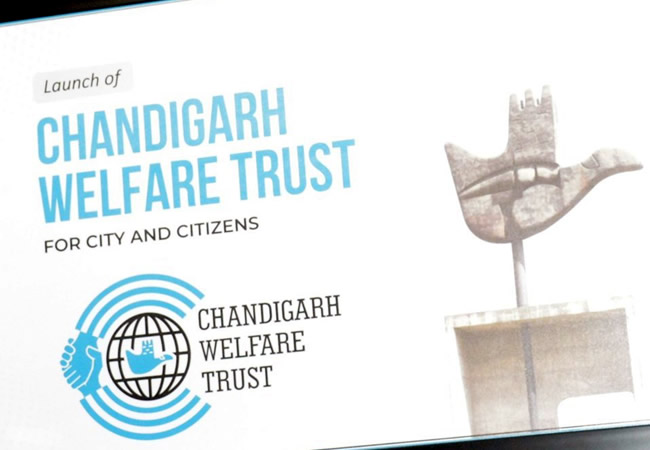
CHANDIGARH, India, January 18, 2022 — With the mission of creating a future full of opportunities, tolerance, social justice, and community well-being at its core, a first-of-its-kind NGO dedicated to the development and welfare of Chandigarh city — Chandigarh Welfare Trust got launched here, today. The Trust aims to align with the UN Sustainable Development Goals, including Education, Gender Equality, Health & Well-Being, Economic Growth, Peace, Justice, Strong Institutions, Poverty, and Climate Action.
Mr. Satnam Singh Sandhu, Chancellor, Chandigarh University, and Founder, Chandigarh Welfare Trust, formally launched the NGO. Members of the Governing Body of the Trust were also present.
Talking to the media, Mr. Satnam Singh Sandhu said that Chandigarh was the first modern city in the country and is among very few such cities worldwide to combine monumental architecture, cultural growth, and modernization. “However, with passing times, things have changed due to the growing population and considerable stagnancy in related resources. This NGO is an attempt to restore and promote Chandigarh’s glory and restitute it as a model of development for other cities in India and elevate its standing among the cities of the world,” he said.
Mr. Sandhu said that the Chandigarh Welfare Trust will work for everyone and will need the support of everyone. The Trust will be working tirelessly, besides providing a platform to others, especially the young generation, to contribute to the development and social service of the city.
“The Chandigarh Welfare Trust aims to work for community well-being and sustainable welfare, besides making the Chandigarh city a leader in all aspects including sanitation, education, cleanliness, quality of life, and health. The Trust will bring together 127 NGOs in the union territory, thousands of individual social workers, UT administration and Municipal Corporation in this mission,” he said.
“A couple of decades ago, we started our journey in serving the society with the establishment of Chandigarh Group of Colleges, followed by the foundation of Chandigarh University a decade later. With the love and support of this city and its citizens, we have today established ourselves as leaders in higher education, matching and even surpassing the global standard. This NGO is a sincere effort at paying back to Chandigarh city and its citizens. Through this, the Trust would provide necessary funds, volunteers, and support to the organizations that are constantly striving to develop the city,” Sandhu added.
He informed that the Trust had identified two projects that require immediate attention and has started working on these already. These are improving the ranking of Chandigarh in Swacchh Bharat Index and establishing it as the cleanest city of the country, and improving the positioning of Chandigarh in the Ease of Living Index.
Emphasizing that Chandigarh gains immensely from the different languages, cultures, customs, and beliefs of the people from all parts of the country that it hosts, Sandhu said, “With such diverse population and culture, Chandigarh is a contemporary metropolis. With 86% literacy rate and 53% of its population working and 38% young- the people of Chandigarh will play a deciding role in providing the impetus in making this city beautiful, recognized at the global map.”
To make this world a peaceful and prosperous place, now and into the future, Chandigarh Welfare Trust will align its energies and functioning with the eight Sustainable Development Goals of the United Nations.
“The Trust has thus identified Equity, Empowerment, Protection, Promotion, and Conservation as its key focus sectors,” Mr. Sandhu said.
Chandigarh University is a NAAC (National Assessment and Accreditation Council) A+ Grade University and an autonomous educational institution located near Chandigarh in Punjab.
Source: Chandigarh University
|GlobalGiants.Com|







Edited & Posted by the Editor | 6:58 AM | View the original post
University Grants Commission (UGC), India, organizes online workshop for Universities and Colleges on Intellectual Property Rights (IPR)


New Delhi, January 17, 2022 — University Grants Commission organized an online workshop for Universities and Colleges on Intellectual Property Rights (IPR).
Smt. Neeta Prasad, Joint Secretary (ICC & Vig.) Department of Higher Education, Ministry of Education, Shri Rajendra Ratnoo, Joint Secretary, DPIIT & CGPDTM, Ministry of Commerce & Industry, and Prof. Rajnish Jain, Secretary, UGC, addressed the Inaugural Session.
Delivering the welcome address, Prof. Rajnish Jain, Secretary, UGC, highlighted the importance of IPR and its importance in the country’s image and its relevance in building the knowledge pool of the country and its legal aspects. He shed light on the historical part of India’s position as creator and innovator. He expressed hope in the day’s deliberations in creating awareness about IPR.
Delivering the Special Address, Smt. Neeta Prasad, Joint Secretary (ICC & Vig.) Department of Higher Education, Ministry of Education stressed the importance of Intellectual Property as the foundation of innovation, research, and creativity. She shared that necessary steps have been taken in India to create a robust innovation and IPR culture in the country, which has significantly improved the relevant innovation and IP numbers, be it the IP filing, IP grant, and IP disposals. However, despite all changes, India is behind many countries in terms of IPR. She stressed that the reason could be a lack of awareness in students for filing patents.
She shared about the Government’s initiative in the areas like the KAPILA program launched for IP literacy and awareness in October 2020, reducing the fee for filing the patent. She suggested that the way forward was proactively protecting knowledge and inventions by respective IPRs in India and other countries.
Shri Rajendra Ratnoo, Joint Secretary, DPIIT & CGPDTM, Ministry of Commerce & Industry, delivered the keynote address. He said there is a need to convert energy into synergy by coming together. He said that there was a need to collaborate instead of working in silos. Mr. Ratnoo further stressed the need for promoting innovation and creation in both art and science. He outlined the importance of partnership between industry, academia, and IPR registration.
The technical session followed the inaugural session, where IP experts gave an overview of the theme.
Dr. Usha Rao, Assistant Controller of Patents & Designs, presented a summary of Intellectual Property Rights. She provided an insight into the need and importance of IPR and the different types of IP and their governing bodies. Dr. Rao also shed light on the various acts and rules of IPR in India. She also discussed the multiple ways of filing the patent processes.
The second expert for the technical round was Shri Sukhdeep Singh, Assistant Controller of Patents & Designs. He addressed the various schemes and privileges for Educational Institutes in IPR. He concluded by stating that the way forward involved the establishment of IP management cells in Universities, having master trainers, and establishing Technology and Innovation Support Centers (TISCs) supported by the World Intellectual Property Organization (WIPO).
The webinar ended with the vote of thanks by Dr. Surender Singh, Additional Secretary UGC.
The online workshop discussed pertinent aspects of Intellectual Property Rights (IPR) for Higher Education Institutions (HEIs). It was an essential step towards making HEIs aware of IPR. Universities and colleges from all over India participated in it.
Source: Ministry of Education
|GlobalGiants.Com|
—The Editor is an Alumnus of the World Intellectual Property Organization (WIPO) Academy, Geneva, Switzerland.







Edited & Posted by the Editor | 6:51 AM | View the original post
January 17, 2022
Prime Minister Modi of India Urges All Countries to Embrace Sustainable Lifestyles through Vision of One Earth One Health
India challenges the world to ditch throwaway consumerism and shift to a circular economy, emphasizing India’s low per capita emissions.
Modi calls for the reform of multilateral organizations to fashion a more democratic approach to global challenges.
India is in the top three countries globally for unicorns, creating over 40 in 2021 and 60,000 start-ups.
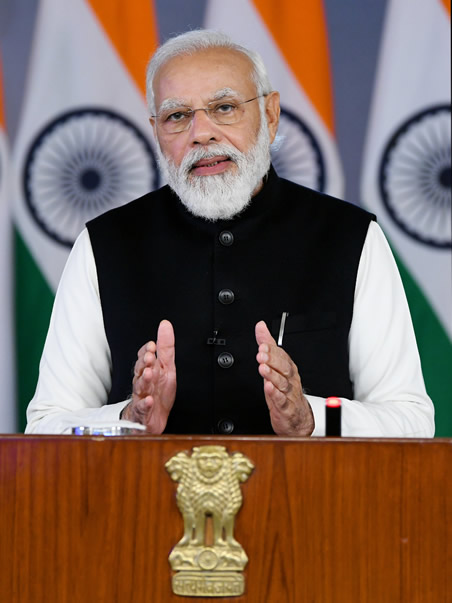
Photo: Narendra Modi, Prime Minister of India, delivers a ‘State of the World’ special address at the World Economic Forum’s Davos Agenda 2022 through video conferencing in New Delhi on January 17, 2022.
Geneva, Switzerland, January 17, 2022 - Prime Minister Narendra Modi of India addressed Davos Agenda 2022 to call on all countries to shift from a throwaway culture towards more sustainable lifestyles. Modi emphasized that while India is home to 17% of the world’s population, it contributes only 5% of global emissions.
“It is essential that we move away from today’s take-make-use-dispose economy and towards a circular economy,” he said. India, which co-launched the International Solar Alliance at COP26 to ensure universal access to affordable solar energy, today generates 40% of its energy from non-fossil sources. Modi underlined that the next phase of India’s growth would be “green, clean, sustainable and reliable.”
The prime minister questioned the ability of the world’s multilateral organizations to meet challenges that did not exist when they were created. He said that reforming these institutions is “the responsibility of every democratic country.” In a clear call for greater global cooperation, he said: “Today, more than ever before, countries need each other’s help - this is the only path to a better future.” He offered India’s vision of One Earth One Health as a means of responding to global challenges, from the COVID-19 pandemic to climate change.
India is an entrepreneurial powerhouse that has created 10,000 new start-ups in the past six months and over 40 unicorns in 2021, Modi said, propelling the country into the top three in the world for billion-dollar new ventures. Its digital infrastructure is developing rapidly, with over 4.4 billion transactions on its United Payments interface in the past month alone. Over 2020-2021, India attracted $82 billion in foreign direct investment - a new record. Modi said India is committed to becoming a trusted partner for global supply chains.
In a bid to improve the ease of doing business, Modi outlined his government’s measures to reduce government intervention to the minimum. He has done away with over 25,000 tax compliances in the past year and deregulated most sectors for investment, except for defense, aerospace, and telecoms. In addition, his government is investing $1.3 trillion on connectivity-related infrastructure through its GatiShakti National Master Plan, which includes connecting over 6,000 villages through an optical fiber. The plan’s aim, he said, is to “give new impetus to seamless connectivity for movement of goods, people and services.” India is also investing $26 billion to boost manufacturing and resilient supply chains.
The Prime Minister also spoke to the importance of collective and synchronized action to face global challenges. He highlighted new technology as an important area for countries to act together, “Another example is cryptocurrency. Given the kind of technology it is associated with, the decisions taken by a single country will be insufficient to deal with its challenges.”
Modi said India enters 2022 “infused with self-confidence.” Its economic growth is projected to hit 8.5%. It has already administered 1.6 billion COVID-19 vaccines. And, he added: “Our multilingual, multicultural environment is a great strength [that] teaches us not just to think of ourselves in times of crisis but to work in the best interests of the world.”
For over 50 years, the World Economic Forum has been the international organization for public-private cooperation. The Davos Agenda 2022 is the focal point at the start of the year for leaders to share their outlook, insights, and plans relating to the most urgent global issues. The meeting will provide a platform to accelerate the partnerships needed to tackle shared challenges and shape a more sustainable and inclusive future.
Source: World Economic Forum
|GlobalGiants.Com|







Edited & Posted by the Editor | 1:16 PM | View the original post
January 16, 2022
University Grants Commission (UGC), India, asks all Universities to join the Academic Bank of Credits and motivate their Students to open Academic Bank Accounts.
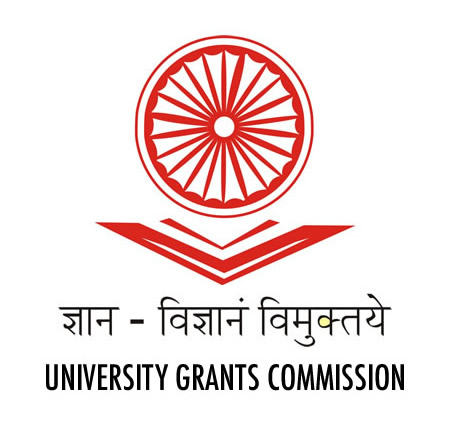

New Delhi, January 15, 2022 — In a letter to the Vice-Chancellors of all Universities and Principals of all Autonomous Colleges, University Grants Commission (UGC) has asked them to make their institutions join the Academic Bank of Credits (ABC) at the earliest. UGC has also instructed the universities to make their students aware of this facility and encourage them to open Academic Bank Accounts.
Further, the Commission has informed the universities that it had declared “The University Grants Commission (Establishment and Operation of Academic Bank of Credits in Higher Education) Regulations, 2021” in the Gazette of India. Now, it has revised these regulations and notified the amendment in the Gazette. Consequently, more Higher Education Institutions, who confer degrees, can now participate in the Academic Bank of Credits irrespective of their NAAC or NIRF ranking.
Source: University Grants Commission
|GlobalGiants.Com|







Edited & Posted by the Editor | 2:50 AM | View the original post
January 15, 2022
U.S. Institute of Peace Nominations are Open for the 2022 Women Building Peace Award
• The annual award recognizes women peacebuilders from conflict-affected countries.
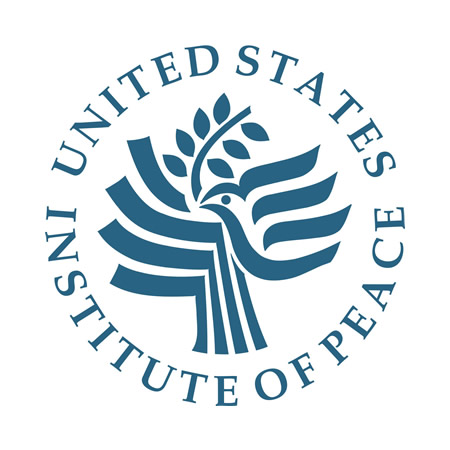
WASHINGTON, January 13, 2022 — The U.S. Institute of Peace (USIP) has announced that nominations are open for the 2022 Women Building Peace Award. This prestigious annual award honors women building peace in countries impacted by violent conflict.
The nominations period will run until February 14, 2022. USIP will recognize the awardee at a ceremony in October 2022.
Countless women risk their lives to create peace in their communities, leading movements for justice and inclusivity despite often being overlooked in their efforts. USIP said it is committed to doing more to support and celebrate these women and the impact they have as agents of peace. USIP invites organizations and people across the globe to take part in identifying and honoring exceptional women who have dedicated their lives to peace.
USIP strongly encourages nominations for women who have not been previously recognized for their peacebuilding work. USIP will review the nominations on the following criteria:
Commitment to Peace: A woman who shows a commitment to peace through her work to prevent or resolve conflict nonviolently in a fragile or conflict-affected country or region.
Exceptional Leadership: A woman who embodies outstanding leadership through her vision and innovation and has earned the respect of others in the pursuit of peace.
Outstanding Practitioner: A woman who is a peacebuilding practitioner and works with members of local, national, or international communities in an inclusive and participatory manner.
Substantial Impact: A woman whose peacebuilding work has led to tangible results.
Women Building Peace Council, a group of distinguished experts who advise USIP on matters of gender and peacebuilding, will choose the 2022 award winner.
Previous Women Building Peace Award recipients include Josephine Ekiru of Kenya and Rita Lopidia of South Sudan. USIP has recognized nineteen women as finalists for the award since its inception in 2019.
The United States Institute of Peace is a national, nonpartisan, independent Institute founded by Congress and dedicated to the proposition that a world without violent conflict is possible, practical, and essential for the U.S. and global security. The Institute works with local partners to prevent, mitigate, and resolve violent conflict in conflict zones abroad. In addition, USIP works with governments and civil societies to build local capacities to manage conflict peacefully to reduce future crises and the need for costly interventions. The Institute pursues its mission by linking research, policy, training, analysis, and direct action to support those working to build a more peaceful, inclusive world.
Source: United States Institute of Peace
|GlobalGiants.Com|







Edited & Posted by the Editor | 11:12 AM | View the original post
World Economic Forum: Davos Agenda 2022 to Mobilize World Leaders around Global Challenges
First global platform for crucial world leaders to share their visions for 2022
The Davos Agenda 2022 will convene on ‘The State of the World’
Heads of state and government will join CEOs and other leaders for a virtual week-long dialogue on critical collective challenges and how to address them
Dialogue will be a springboard to the Annual Meeting in Davos, scheduled for early summer

Photo: Impressions from the Annual Meeting 2019 of the World Economic Forum in Davos, January 20, 2019. Image provided by & copyright © World Economic Forum / Benedikt von Loebell.
Geneva, Switzerland, January 14, 2022 - Two years since the start of the COVID-19 pandemic, global leaders will convene for the World Economic Forum’s Davos Agenda 2022, from 17-21 January. This year, it will be the first global platform to provide an opportunity for crucial heads of state and government, together with chief executives and leaders from civil society and international organizations, to reflect on the “State of the World” and shape solutions for critical challenges in the year ahead.
Radically different pandemic experiences have exacerbated global divisions. Vaccine inequities, combined with new strains, have also slowed global economic recovery. However, as the Global Risks Report 2022 clarifies, COVID-19 is only one of the critical global challenges that may become unmanageable unless world leaders prioritize proactive collaboration. Accordingly, the Davos Agenda will drive concerted action among key international stakeholders.
Klaus Schwab, Founder and Executive Chairman of the World Economic Forum, said: “Everyone hopes that in 2022 the COVID-19 pandemic, and the crises that accompanied it, will finally begin to recede. But major global challenges await us, from climate change to rebuilding trust and social cohesion. To address them, leaders will need to adopt new models, look long term, renew cooperation and act systemically. The Davos Agenda 2022 is the starting point for the dialogue needed for global cooperation in 2022.”
Through Special Addresses and panels with leaders of G20 economies and international organizations, the Davos Agenda 2022 will provide crucial insights into a range of critical challenges. In addition, participants will hear first-hand how these leaders will drive action in these and other areas.
• World leaders delivering “State of the World” Special Addresses will include:
- Narendra Modi, Prime Minister of India;
- Kishida Fumio, Prime Minister of Japan;
- António Guterres, Secretary-General, United Nations;
- Ursula von der Leyen, President of the European Commission;
- Scott Morrison, Prime Minister of Australia;
- Joko Widodo, President of Indonesia;
- Naftali Bennett, Prime Minister of Israel;
- Janet L. Yellen, Secretary of the Treasury of the United States;
- Yemi Osinbajo, Vice-President of Nigeria.
The Davos Agenda 2022 will also mobilize government and business leaders, international organizations, and civil society to share their outlook, insights, and plans on the most urgent global issues such as climate change, social contracts, and vaccine equity. These sessions will also provide a platform for a broader connection, enabling the international public to engage and get included in the conversation.
• Key sessions will include:
- COVID-19 - What’s next? (January 17)
- Technology Cooperation in the Fourth Industrial Revolution (January 17)
- Renewing a Global Social Contract (January 18)
- Meeting the Challenge of Vaccine Equity (January 18)
- Navigating the Energy Transition (January 19)
- Accelerating and Scaling up Climate Innovation (January 19)
- ESG Metrics for a Sustainable Future (January 20)
- Live from Space: The Next Frontier for Knowledge and Action (January 20)
- Global Economic Outlook (January 21)
- Building Future Preparedness (January 21)
• The program will feature:
- Tedros Adhanom Ghebreyesus, Director-General, World Health Organization (WHO);
- Fatih Birol, Executive Director, International Energy Agency;
- José Pedro Castillo Terrones, President of Peru;
- Ivan Duque, President of Colombia;
- Anthony S. Fauci, Director, National Institute of Allergy and Infectious Diseases, National Institutes of Health of the United States of America;
- Yasmine Fouad, Minister of Environment of Egypt;
- Kristalina Georgieva, Managing Director, International Monetary Fund (IMF);
- Alejandro Giammattei, President of Guatemala;
- Al Gore, Vice-President of the United States (1993-2001) and Chairman and Co-Founder, Generation Investment Management;
- Paulo Guedes, Minister of Economy of Brazil;
- Paula Ingabire, Minister of Information Communication Technology and Innovation of Rwanda;
- Paul Kagame, President of Rwanda;
- John F. Kerry, Special Presidential Envoy for Climate of the United States of America;
- Christine Lagarde, President, European Central Bank;
- Guillermo Lasso, President of Ecuador;
- Ngozi Okonjo-Iweala, Director-General, World Trade Organization (WTO);
- Carlos Alvarado Quesada, President of Costa Rica;
- Abdulaziz Bin Salman Bin Abdulaziz Al Saud, Minister of Energy of Saudi Arabia;
- Nicolas Schmit, Commissioner for Jobs and Social Rights, European Commission;
- François Villeroy de Galhau, Governor of the Central Bank of France;
- Sarah bint Yousif Al-Amiri, Minister of State for Advanced Technology, UAE.
Source: World Economic Forum
|GlobalGiants.Com|







Edited & Posted by the Editor | 3:15 AM | View the original post
January 14, 2022
University Grants Commission organizes a webinar on "Cyber security empowerment of Higher Education Institutions (HEIs)."

New Delhi, January 13, 2022— The Government of India has launched a 75-week long campaign, Azadi ka Amrit Mahotsav, to celebrate the country’s achievements. The University Grants Commission (UGC), as part of this campaign, is conducting a series of activities beginning with a sensitization webinar on “Cyber security Empowerment of Higher Education Institutions (HEIs),” an effort towards making cyber security more accessible, available, and adaptable for HEIs.
Prof. Rajnish Jain, Secretary, UGC, delivered the welcome address and introduced all panelists. He set the context for the Webinar, stressing the need for cybersecurity awareness with the increased dependence on IT post-pandemic. Prof. Jain emphasized that the pandemic has put Higher Education in cyberspace, making HEIs face cybersecurity issues. He said that there is a need for HEIs to understand how they can address cyber security issues and manage cyber hygiene.
Lt. Gen. (Dr.) Rajesh Pant, Chief (retd.), National Cyber Security Coordinator, National Cyber Coordination Centre, PMO delivered the keynote address. He reiterated the threat cybercrime poses to the economy and national security. Lt. Gen. Pant focused on Cybersecurity for personal information and intellectual property in the HEIs. He highlighted the institutions’ structure that makes them susceptible to cybercrimes and the measures to address these issues.
Shri Abhishek Singh, CEO, My Gov, and President & CEO NeGD, Ministry of Electronics & Information Technology, emphasized the importance of cyber security due to the increased dependency and use of cyberspace. He touched upon the various aspects of cybercrimes and the processes for reporting cybersecurity issues.
Mr. Deepak Virmani, Deputy Secretary, Indian Cyber Crime Coordination Centre, Cyber & Information Security, Division, Ministry of Home Affairs, spoke about the Ministry of Home Affairs’ initiatives and its efforts in controlling Cybercrimes. He discussed the seven verticals of the scheme involving training police personnel and government functionaries.
Dr. Charru Malhotra, Coordinator, Centre of e-Governance, Indian Institute of Planning and Administration, New Delhi, brought out the findings on Cybersecurity through analysis of a pre-webinar questionnaire shared with HEIs. She highlighted the current status amongst HEIs about cyber security and their preparedness.
Through his address, Prof. Naveen Chowdhary, National Forensic Science University, Gandhinagar, shared the cybersecurity threat landscape highlighting cases of compromises on Cybersecurity in Educational Institutions’ research facilities. In addition, he provided a detailed outlook and a framework for Cybersecurity.
Dr. Atul Kumar Pandey, Chairperson, Rajiv Gandhi National Cyber Law Centre, NLIU, Bhopal, spoke about the threat landscape in HEIs and the importance of Cybersecurity in HEIs. He shed light on various components like content protection and privacy and capacity building for addressing Cybersecurity.
The address by the panelists was followed by a Question and Answer session from the faculty members from HEIs.
The Webinar discussed cyber security issues of HEIs. It was the first step towards cyber security sensitization and awareness of Higher Education Institutions.
Source: Ministry of Education, Government of India
|GlobalGiants.Com|







Edited & Posted by the Editor | 12:59 PM | View the original post
January 13, 2022
New One-of-a-Kind World Citizenship Report Gives Switzerland Top Spot with Asian Countries Not Far Behind
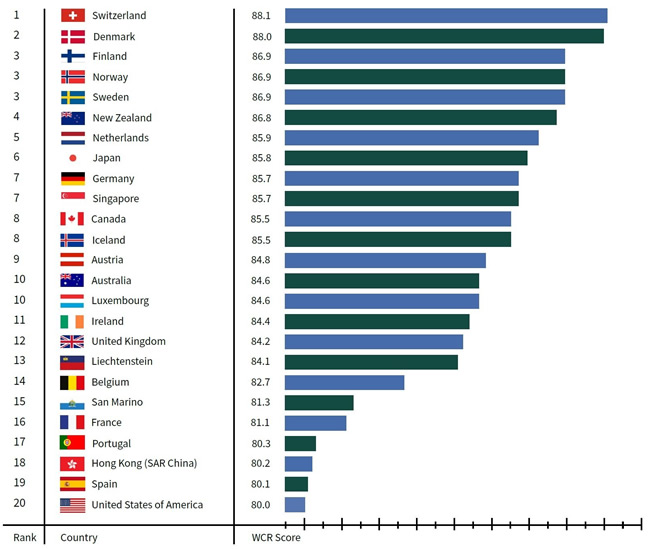
Photo: The top-scoring countries in the World Citizenship Report (WCR).
LONDON, Jan. 12, 2022 — CS Global Partners, one of the world’s leading government advisory and marketing firms, has released its much-anticipated World Citizenship Report (WCR). The WCR showcases the World Citizenship Index (WCI), a unique tool that compares world citizenships from the perspective of a global citizen. The index’s methodology evaluates 187 jurisdictions across five key motivators defining citizenship for the global citizen.
Reliance was placed on official statistics to evaluate a score for the defined motivators of Safety and Security, Quality of Life, Economic Opportunity, Global Mobility, and Financial Freedom. Backed by research from leading data banks, interviews, and a survey undertaken by over 500 wealthy investors, the WCR looks beyond passport strength and emphasizes pivotal factors that play a role in choosing the proper second citizenship.
Micha Emmett, the CEO of CS Global Partners, said that the WCR stands apart from other reports in the industry. Because it “examines which countries offer the most benefits for global citizens, particularly in a post-COVID world where those that have the means are consistently searching for greater opportunities and better protection.”
“We wanted to capture what truly concerns and affects a global citizen,” she said. “When there are options to gain a second or third citizenship, the first question in a High-net-worth individual (HNWI) mind is ‘where is the next place to be associated with?’”
“High-net-worth individuals must consider a myriad of factors when deciding something as monumental as where to obtain second citizenship and build a second home. While passport strength is, of course, an important component, it is also one that is subject to the greatest change as evidenced by pandemic-related travel restrictions,” she added.
Results show Switzerland scoring the highest with 88.1, followed by Denmark (88.0) in second place and Finland, Norway and Sweden tied for third (86.9). Notably, global superpowers such as the United States did not rank in the top ten, symbolizing a significant shift in what these economic giants can tangibly offer the global elite. Comparatively, Asia emerged as a hub for economic prosperity due to its business advantages, particularly Japan, ranked sixth, and Singapore, ranked seventh.
Aside from analyzing the performance of countries, the WCR looks at ways HNWIs protect and grow their wealth. It includes implementing an effective financial plan that considers inheritance and wealth taxes and investing in emerging valuable assets like cryptocurrency.
The report finds that citizenship by investment (CBI) is also an effective tool for the world’s wealthiest, and it has become a trend exacerbated during the pandemic. CBI offers an alternative and time-effective solution for those who do not have a marriage, descent, or naturalization attachment to other countries. It ultimately enables applicants to obtain a second citizenship, often within three to four months, without any former ties to the nation, as long as they can pass a multi-tiered vetting procedure.
According to the report, entrepreneurs and business people actively sought investments that stood the test of time during the thick of lockdowns. While predicting the future isn’t possible, keeping abreast of global trends has enabled many HNWIs and global citizens to identify opportunities in places they may not have considered before. The WCR aims to bring these trends to light and make the second citizenship process simpler by compiling relevant data that most concerns affluent individuals and their families.
Source: CS Global Partners
|GlobalGiants.Com|







Edited & Posted by the Editor | 2:30 AM | View the original post
The Coca‑Cola Company lights Burj Khalifa to introduce a new Global Brand philosophy and visual identity to the Middle East.
’ Real Magic,’ Coca‑Cola’s first new global philosophy since 2016, and a new perspective on its iconic logo, both revealed during a stunning light show.

Coca-Cola has built the philosophy around crucial lessons learned over the last 18 months: that we can find the magic all around us when we come together in unexpected moments that elevate every day into the extraordinary. It also acknowledges the many contradictions experienced as new generations find harmony and human connection in a virtual and divided world.
“Magic isn’t about the unbelievable or mystical, but about those moments of real human connection. Real Magic can happen at any given moment and can be extraordinary,” said Tarun Sabhlok, Region Marketing Director - the Middle East at The Coca‑Cola Company. “The Real Magic philosophy is rooted in the belief that differences can make the world a more exciting place. So there was no better place to celebrate the Real Magic of humanity than in the most diverse nation in the world, on the most iconic landmark in the region - the Burj Khalifa,” he added.
Source: The Coca‑Cola Company
|GlobalGiants.Com|
Magic On Burj Khalifa
Magic is happening all around us. You have to take a look.
A button was pressed that lit the Burj Khalifa bringing real Magic to all those around that day.







Edited & Posted by the Editor | 2:30 AM | View the original post
January 12, 2022
THE (Times Higher Education) acquires Inside Higher Ed, claims unrivaled reach across Higher Education Markets
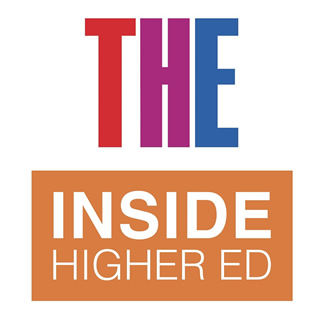
LONDON, Jan. 10, 2022— THE (Times Higher Education), the world’s leading provider of higher education data and insights, says it has completed the acquisition of Inside Higher Ed, the U.S. provider of news, analysis, and solutions for universities and colleges.
The acquisition brings together two of the leading brands in global higher education, with combined audiences exceeding 50 million unique users per year, encompassing university leadership, faculty, professional staff, and students, as well as policymakers and others.
Inside Higher Ed, founded in 2004, reaches an annual audience of 25 million, consisting primarily of higher education professionals in the U.S., with its independent news and analysis, industry insights, jobs board, and other tools and services.
It joins THE’s portfolio of companies at an exciting time. THE has offices in the U.K., U.S., Australia, and Singapore. Inflexion Private Equity had acquired THE in February 2019 following a period of rapid global growth.
Celebrating its 50th anniversary in 2021, THE continues to provide news, insights, and thought leadership and works with thousands of universities globally, collecting data from more than 3,500 institutions and working with 800 clients across its data, consultancy, and hiring services. It is also known for its events, including the flagship THE World Summit Series, which engaged over 45,000 people globally in 2021.
Inside Higher Ed will continue to operate independently under its existing brand. The two businesses will bring together their expertise, relationships, and insights, and together will have unrivaled reach across the world’s key higher education markets.
This combined scale and their complementary strengths and services will enable THE and Inside Higher Ed to enhance their shared mission to provide news, information, and services that help colleges and universities to analyze and improve their performance whatever their strategic goals.
Scott Jaschik, who founded Inside Higher Ed with fellow co-editor Doug Lederman, said: “We are thrilled to be joining forces with THE, especially during this period of growth. We have often collaborated with THE, and this new chapter in our relationship will allow us to be more effective than ever at informing the world about higher education.”
Paul Howarth, CEO at THE, commented: “The rapid organic growth that THE has seen in recent years has been driven by its evolution into a robust, global data business. With the backing of our investors at Inflexion Private Equity, we are in a position to strengthen our place in the market through strategic acquisitions. We see Inside Higher Ed as an ideal partner as we continue to extend our reach and the services we offer. It is a business that shares THE’s values and mission to support excellence in higher education.
“We look forward to working with Scott, Doug, Inside Higher Ed CEO Dari Gessner, and the wider Inside Higher Ed team so that together we can do even more to support universities and colleges across the U.S. and the rest of the world.”
Source: Inside Higher Ed
|GlobalGiants.Com|







Edited & Posted by the Editor | 11:30 AM | View the original post


